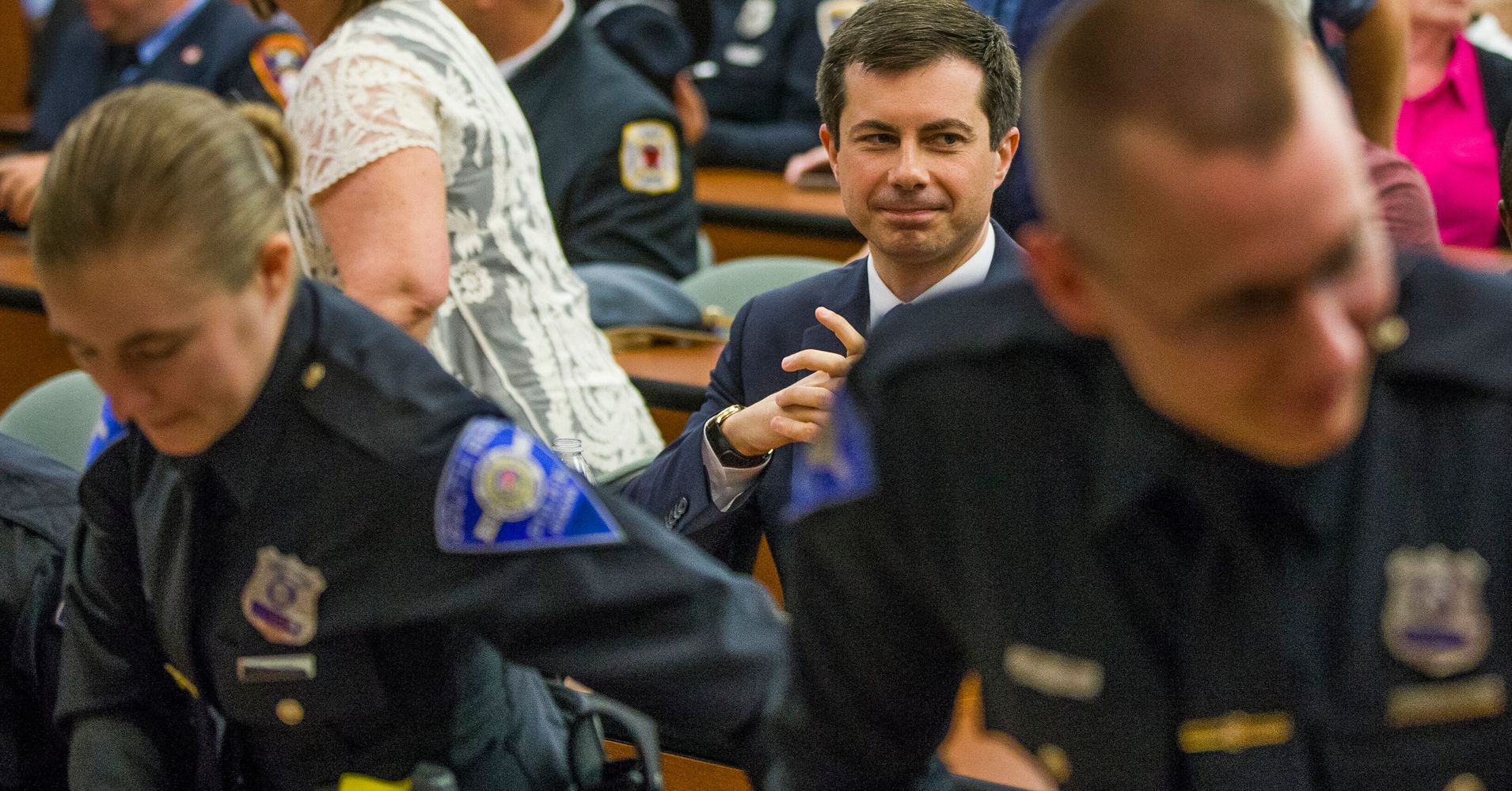[ad_1]
This week, in the midst of a surprisingly successful presidential campaign, South Bend Mayor Pete Buttigieg canceled several events to go back to his Indiana town and address a crisis: A white police officer with a history of making racist comments shot and killed a 54-year-old black man named Eric Logan. And Buttigieg’s black constituents are less than pleased with his response.
“How’s he handling it?” Oliver Davis, the longest-serving black member of the South Bend Common Council, told The Washington Post. “Well, he talked to the media before the family. He skipped the family vigil, full of black residents. And then he gave a speech to the police. So, how do you think that went over?”
Buttigieg announced on Friday that he would stay in South Bend through the weekend to march with community members and “promote healing,” canceling several campaign events to do so.
Before this week, Buttigieg’s campaign had taken some heat for its lack of clear policy plans. In an interview with BET contributor George Johnson about police brutality earlier this month, though, the South Bend mayor said he hopes to bring “some of the measures we have taken in South Bend” to the national level ― words that, in light of Logan’s death, may now fall flat.
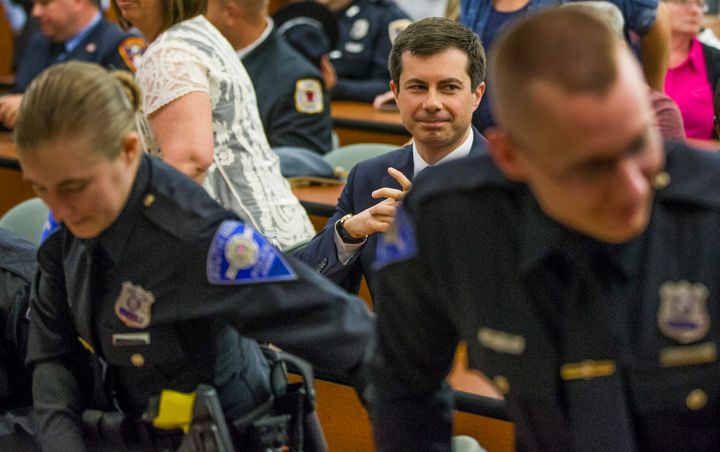
Those measures specifically include “transparency around use of force” and, as was the case when Buttigieg had “an ally in the White House” under the Obama administration, the implementation of body cameras “for accountability and integrity in the police department.” (The officer who shot Logan was not wearing one.)
“Policing really represents the beginning of somebody’s encounter with a system that has a lot of systemic racism, not just historically but if you just look at things like sentencing disparities, we know these biases are alive and well and happening right now,” he told Johnson. “If we get that right, even things that aren’t police issues like mandatory minimums or walking away from incarcerations of drug possessions it does filter back into policing.”
Buttigieg is one of several 2020 Democratic presidential candidates with strong backgrounds in managing law enforcement. New York City Mayor Bill de Blasio manages the largest police force in the country. Sen. Cory Booker (D-N.J.), who was previously mayor of Newark, also ran his city police department. Sen. Kamala Harris (D-Calif.) spent over a decade as a prosecutor, serving as district attorney of San Francisco and later as California’s attorney general. Sen. Amy Klobuchar (D-Minn.) served as county attorney for her state’s most populous county.
Beyond that, Sens. Elizabeth Warren (D-Mass.) and Bernie Sanders (I-Vt.) just endorsed Tiffany Cabán, a Queens native running for district attorney in the borough who has pledged to investigate and prosecute cops accused of using excessive force.
Here’s how some of the other 2020 Democratic candidates stack up on their views and actions toward police brutality and policing reform.
Kamala Harris
Sen. Kamala Harris’ popularity among police has ebbed and flowed — after she refused to call for the death penalty for the man who shot and killed a San Francisco cop, she lost the support of police unions across the state.
Despite the California Democrats’ image as a “progressive prosecutor” who is “smart on crime,” her critics have called her “tough on crime,” “a cop” and “on the wrong side of history.” The human toll of many of her initiatives, like her fight against truancy and wrongful conviction cases, has been severe.
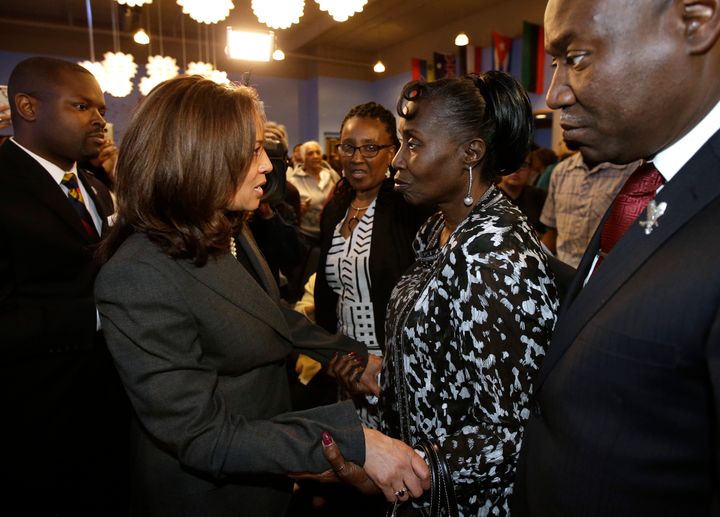
But where police brutality is concerned, Harris’ campaign maintains that the first-term senator has long worked to keep police accountable and curb instances of excessive force.
“There’s no question that the issue of racial profiling is something that has to be addressed,” Harris told NPR in 2011, when she was district attorney. “It has to be the responsibility of law enforcement, together with communities, to engage in whatever education is necessary, training is necessary, or discipline that is necessary to eliminate racial profiling in our society.”
As California’s attorney general, Harris investigated the Kern County Sheriff’s Office and the Bakersfield Police Department after complaints of excessive force. Under her leadership, the California Department of Justice became the first statewide agency to implement a body camera program. She initiated the Open Justice program, an open data project that tracked arrests, bookings and police custody deaths. She updated California’s implicit bias training after demanding a 90-day review of the program. As a senator, she co-sponsored the End Racial and Religious Profiling Act, and she also backed a bill that would allocate federal funds to police body camera implementation.
Harris stands by her complicated legacy as a prosecutor, but since launching her campaign in January, has changed some of her views. Last month, she announced that she supports independent investigations of law enforcement agencies, another major ― and arguably more progressive ― shift.
Elizabeth Warren
Sen. Elizabeth Warren’s campaign points to her record of supporting the Black Lives Matter movement and attempting to demilitarize law enforcement to demonstrate her commitment to confronting police brutality.
In 2015, after Freddie Gray, Michael Brown and Sandra Bland were killed by or died while in the custody of police, Warren said, in a speech that was celebrated by racial justice activists across the country, that their “lives have been treated with callous indifference.”
“None of us can ignore what is happening in this country,” the Massachusetts senator said. “Not when our black friends, family, neighbors literally fear dying in the streets. … It comes to us to once again affirm that black lives matter, that black citizens matter, that black families matter.”
“Warren, better than any political leader I’ve yet heard, understands the protests as a matter of life or death — that the American dream has been sustained by an intentional violence and that the uprisings have been the result of years of lived trauma,” DeRay Mckesson, a Black Lives Matter activist, said after the speech.
Warren has also called for demilitarizing the police, and in 2018 she co-sponsored the bipartisan Stop Militarizing Law Enforcement Act, which bars any Department of Defense property from being transferred to federal or state law enforcement agencies.
Most recently, at a CNN town hall in April, Warren said the “heart of the problem” of the criminal justice system “is race.”
“Study after study after study shows us that African Americans compared with whites are more likely to be — for exactly the same crimes — they’re more likely to be arrested, they’re more likely to be arraigned, they are more likely to be taken to trial,” she said. “That is a criminal justice system that is not only locking up too many people, it is a criminal justice system that has a problem of race right at the heart of it, and we need to call it out for what it is.”
In the same town hall, she echoed her support for police demilitarization.
“We need to take weapons of war off our city streets,” she said.
Joe Biden
In 2016, a week after the deaths of two unarmed black men, Philando Castile and Alton Sterling ― as well as a Dallas shooting that resulted in five dead police officers ― former Vice President Joe Biden took a “both sides” approach when discussing police brutality, while still acknowledging that institutional racism “exists throughout our society.”
“There’s a great deal of anxiety and fear,” he said. “Fear on the part of police officers that they become targets and fear on the part of some of the communities that they are, in fact, targets of the police.”
Biden has leaned heavily on the idea that he would be a continuation of the Obama administration, which took a proactive approach to investigating police violence and racism in police departments through the implementation of consent decrees after the deaths of Freddie Gray and Michael Brown.
Biden’s campaign did not return requests for comment for this piece.
Bernie Sanders
“Bernie believes that violence and brutality of any kind, particularly at the hands of the police meant to protect and serve our communities, is unacceptable and must not be tolerated,” Sarah Ford, a spokeswoman for Sen. Bernie Sanders’ presidential campaign, told HuffPost earlier this month. The independent senator from Vermont has added onto his 2016 plan to combat police brutality.
Like Warren, Sanders prioritizes the demilitarization of police. Other initiatives include implementing a new model police training program that “ends the unaccountable use of excessive and lethal force,” investing in community policing, requiring federally funded body cameras, and keeping a database of police shootings and deaths that occur in police custody. He would also require that the U.S. Attorney General’s Office investigate any police custody deaths.
Sanders also wants to chip away at the current “culture” of police departments ― by diversifying them to represent their communities and making it easier for officers to report one another without fear of retaliation.
“We need a societal transformation to make it clear that black lives matter and racism will not be accepted in a civilized country,” Ford said on behalf of the campaign.
Bill de Blasio
Activists and organizers have said New York City Mayor Bill de Blasio hasn’t done enough to curb police brutality and hold police officers accountable for use of excessive force, considering that the police officers behind the deaths of Eric Garner and Ramarley Graham are still employed by the NYPD.
“Over the past four years, Mayor Bill de Blasio could have acted at any time to hold the NYPD accountable for my son’s killing and fired the officers responsible for killing him and failing to provide aid or intervene,” Garner’s mother, Gwen Carr, wrote in a BuzzFeed op-ed. “Every step of the way, he has chosen not to.”
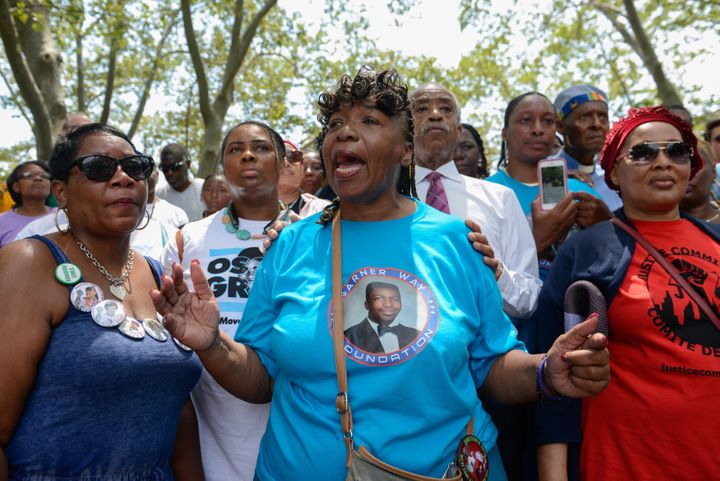
After running a mayoral campaign based on criminal justice reform in 2013, de Blasio has been criticized not just by reform advocates, but by people on both sides of the aisle.
Just last month, NYPD Commissioner James O’Neill spoke out against de Blasio’s bail reform initiative. The policy, which went into effect June 1, essentially allows teens who committed crimes to participate in a supervised release program instead of serving any jail time while they await adjudication of their case.
“The new law on bail and desk appearance tickets will make the work of disrupting criminals and deterring crime much more difficult,” O’Neill wrote in an op-ed in the Daily News.
De Blasio has also been criticized by others in the law enforcement community.
“Releasing teens who have committed armed robberies or serious assaults flies in the face of every police officer working to fight crime,” Pat Lynch, president of the Police Benevolent Association of New York City, said about the initiative. The same police union didn’t spare any words for de Blasio’s presidential campaign announcement, either.
“It is laughable that a mayor who has shown no interest in running New York City for six years now says he wants to mismanage the entire country,” a statement from the union read.
“Those on the fringes either think the mayor hates cops or that the mayor protects cops at all costs,” De Blasio’s mayoral spokesman Eric Phillips told Politico in 2018.
De Blasio’s actual successes lie somewhere in the middle.
Under de Blasio’s tenure, the American Civil Liberties Union reported, stop-and-frisk searches have gone way down ― though still disproportionately affect men and boys of color. Citywide implicit bias training, a cornerstone of de Blasio’s campaign and criminal justice reform initiative, started last year with a for-profit training company that doesn’t track whether law enforcement officers actually implement new practices from the training, though officers in other states have reportedly found it effective.
Cory Booker
Sen. Cory Booker announced his candidacy in February and has spent much of his campaign running on the platform of criminal justice reform. Much of his energy as a senator from New Jersey and previously during his time as mayor of Newark has been spent on the issue, attempting to undo much of the damage the war on drugs did to low-income communities and communities of color.
In a 40-minute speech in December, Booker said that living in the inner city has shaped much of his politics on criminal justice.
“I’m the only U.S. senator that lives in the inner city,” he said. “I don’t know if any other senator had shootings on their block this year. … I lived across the street from a drug treatment center, and sometimes I’ve sat with the men and women in those circles and I just see beauty. I see divinity. I see God.”
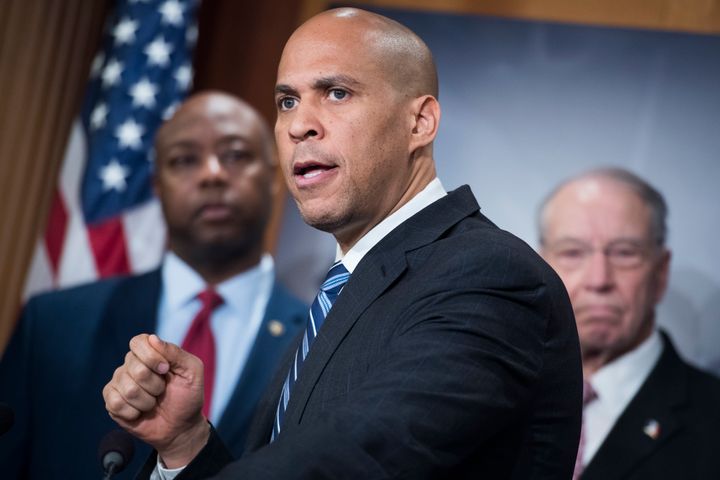
He has also spoken out about his own experience being racially profiled.
“I remember at Stanford just being pulled over surrounded by numerous cops all around my car, screaming at me,” he told film director Spike Lee last fall. “And then after it was all over, sitting there sort of holding my steering wheel, shaking, worrying that I was going to get … God knows what — anywhere from arrested to shot,” he added. “I remember taking my hand off the steering wheel once to scratch my head, or something like that, and just getting screamed at.”
Booker co-sponsored the First Step Act last year, which aims to reduce recidivism and shorten prison sentences for nonviolent drug offenders. Since announcing his campaign, he has introduced the exhaustive Next Step Act, which would tackle law enforcement practices by prohibiting racial and religious profiling and requiring implicit bias training. This week, he announced that, if elected, he would grant clemency to more than 17,000 nonviolent drug offenders on his first day in office.
Amy Klobuchar
Sen. Amy Klobuchar of Minnesota served as “top cop” county attorney in Hennepin County ― which includes Minneapolis ― for eight years in the early 2000s. During that time, Klobuchar declined to criminally charge several law enforcement officers who used excessive force despite their roles in 29 civilian deaths.
Klobuchar has been criticized for passing the cases over to grand juries, which her critics consider her way of dodging responsibility.
The most notable case was that of Courtney Williams, a 15-year-old black boy who was fatally shot by a member of the Minneapolis police force. Williams’ mother, Tahisa Williams-Brewer, maintains that he was unarmed. When Klobuchar punted his case to a grand jury, Williams-Brewer wrote to Klobuchar urging her to take on the case.
“As far as I am concerned, the grand jury is a way of hiding that the prosecutor is not giving the full information of guilt to the grand jury,” she wrote. “Prosecute this man, and make that decision for yourself, and then be accountable to the people for it.”
The grand jury cleared the officer of any wrongdoing.
Julián Castro
When former Housing and Urban Development Secretary Julián Castro launched his presidential campaign in January, he said the U.S. must “overhaul and reimagine our justice system.”
Earlier this month, he unveiled his plan to do just that.
The People First Policing initiative, which many have called the most comprehensive plan to fix policing among all of the 2020 campaigns, would not just implement implicit bias training and body cameras but completely restrict the use of deadly force “unless there is an imminent threat to the life of another person, and all other reasonable alternatives have been exhausted.” The plan would also restrict any use of force that causes collateral damage (like gunshots).
Castro has been outspoken about racial disparities in police brutality and spoke out about the deaths of Tamir Rice and Eric Garner at the hands of police while armed (and white) violent offenders, such as Dylann Roof, were arrested without incident.
“How many of these videos do we have to watch to understand that even though we have some great police officers, this is not a case of bad apples?” Castro asked at the MoveOn Forum in San Francisco earlier this month.
“The system is broken, so let’s fix it.”
REAL LIFE. REAL NEWS. REAL VOICES.
Help us tell more of the stories that matter from voices that too often remain unheard.
[ad_2]
Source link

